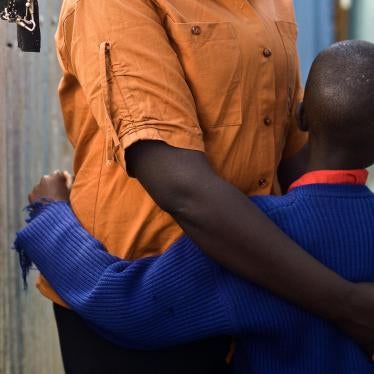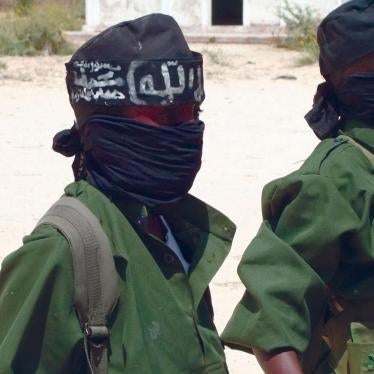(New York) – The United Nations and its member countries should do more to investigate and prosecute peacekeepers who commit sexual exploitation and abuse, and to support the survivors, Human Rights Watch said today. In his annual report on special measures for protection from sexual exploitation and abuse, issued on March 4, 2016, UN Secretary-General Ban Ki-moon pledged reforms to improve accountability for abuse by peacekeepers and increased support to survivors. The measures he announced include stricter vetting of new UN personnel and quicker investigations.
For the first time, the secretary-general formally published information on the nationalities of the peacekeepers who are alleged to have sexually abused and exploited women and girls while wearing UN blue helmets. Previously, the UN’s engagement with countries whose peacekeepers were accused of abuse has always been private. The report follows an external independent report focused on abuse by peacekeepers in the Central African Republic that recommended improvements in the UN system’s response to peacekeeper abuse.
“The UN’s reputation for protecting civilians is at stake,” said Sarah Taylor, women’s rights advocate at Human Rights Watch. “The secretary-general’s report shines a bright light on peacekeeper abuses, but countries that contribute peacekeeping troops will need to follow through on prosecuting these crimes.”
The report covers allegations of abuse within the UN system under investigation in 2015, including in peacekeeping and political missions. It comes after a year of multiple allegations of sexual exploitation and abuse by UN peacekeepers. In January 2016, Human Rights Watch documented eight cases of sexual exploitation and abuse by UN peacekeepers in the Central African Republic, including rape and gang rape. The lack of a coordinated UN response led to a failure to uphold international standards for interviewing and protecting survivors and referring them to needed services, Human Rights Watch said.
Exploitation and abuse by UN peacekeepers and personnel has been reported since the 1990s concerning peacekeeping missions in Bosnia and Herzegovina, Cambodia, the Democratic Republic of Congo, East Timor, Haiti, Liberia, Sierra Leone, and South Sudan, among others. Troops from Pakistan, Bangladesh, Sri Lanka, Uganda, Burundi, the Republic of Congo, and the Democratic Republic of Congo have been among those implicated in the abuse, although some of those cases concerned peacekeeping forces led by the African Union.
The UN has made previous commitments toward a “zero tolerance” policy on abuse by peacekeepers, including through its contracts with troop-contributing countries and commitments to conduct preliminary investigations of these crimes. However, these efforts were stymied by a lack of information about allegations and suspects, and a lack of transparency about investigations and prosecutions, which usually take place in the troop-contributing country. In many cases, there were political obstacles because the UN depends on troops from these same governments to staff its missions around the world.
“The pattern of peacekeeper abuse has continued in large part because the UN peacekeeping system depends on the very troops committing the abuse,” Taylor said. “But playing politics when civilians’ security is at risk is a slap in the face to victims and shouldn’t be tolerated.”
Ensuring safety and services for abuse survivors should be at the center of UN and government response to abuses by peacekeepers and other UN personnel, Human Rights Watch said. A 2015 report from the Office of Internal Oversight Services (OIOS), the UN’s internal watchdog, in its evaluations of the UN’s response to sexual exploitation and abuse said, “Very few victims have been assisted due to lack of dedicated funding and the slow enforcement process.” Human Rights Watch found a similar response in the Central African Republic, where limited staff and resources, a dearth of medical services, and a lack of a clear, coordinated response among UN agencies meant delays in reporting and delays in support to survivors.
In the past year, the UN has taken some steps to improve its response to allegations of sexual exploitation and abuse in UN missions. They include a commitment for greater transparency on allegations and suspects, and the establishment of a UN senior panel on peacekeeper abuse. The February 2016 appointment of Jane Holl Lute as special coordinator on improving the response to abuse crimes aims to bring greater visibility and accountability at a senior level in the UN. In the new report, the secretary-general promises to hold troop leadership to account, including by sending commanders and troops home and suspending payment to individuals and member countries if allegations are substantiated.
“The UN needs to show leadership for ending sexual exploitation and abuse throughout its system, from headquarters in New York to field missions in conflict areas,” Taylor said. “Governments should stop paying lip service to this issue and take concrete actions such as improving training for their troops and punishing those responsible for abuses.”
Human Rights Watch urges the UN to:
- Give priority to the security and well-being of survivors in its response to sexual exploitation and abuse, including through promoting best practices such as maintaining confidentiality, minimizing repeated trauma from multiple interviews, and ensuring rapid access to medical and psychosocial care.
- Follow through on previous commitments, such as regularly monitoring the status of investigations and prosecutions by troop-contributing countries, holding member countries to a six-month deadline to conclude investigations, and regularly providing public information about suspects’ countries of origin and status of investigations. UN country reports should include updates on investigations of abuse by peacekeepers and should be expanded beyond allegations of sexual abuse to cover all serious human rights violations, including unlawful killings and enforced disappearances.
- Establish a senior position in all UN field missions to ensure best practices for both investigations and survivor protection, including coordination of UN investigations, and ensuring provision of medical and psychosocial care for survivors.
- Ensure that peacekeepers receive consistent training on the UN’s “zero tolerance” policy on sexual exploitation and abuse, including clear communication about the consequences for personnel who violate this policy.
- Ensure prompt repatriation of units responsible for serious crimes after proper investigations have been conducted. Publicly and regularly demand accountability for these crimes until the perpetrators are brought to justice.
- Make clear to troop-contributing countries that their ability to provide accountability for crimes committed by their peacekeepers will be an essential criteria in deciding whether to accept more of their troops in UN peacekeeping missions.







